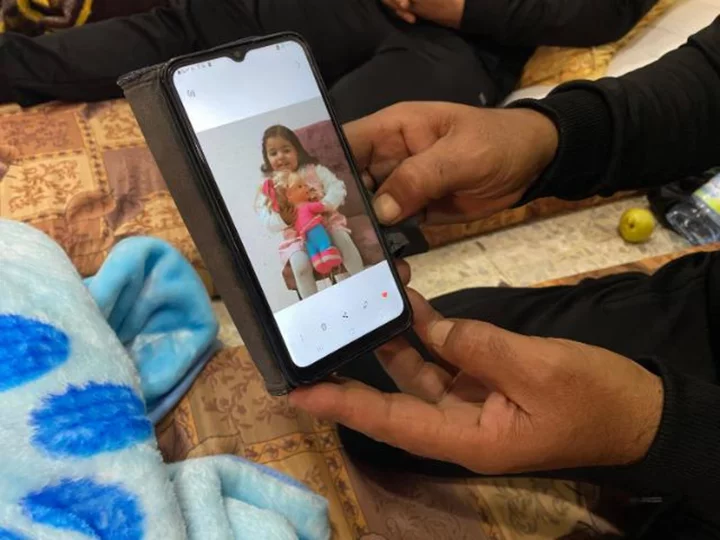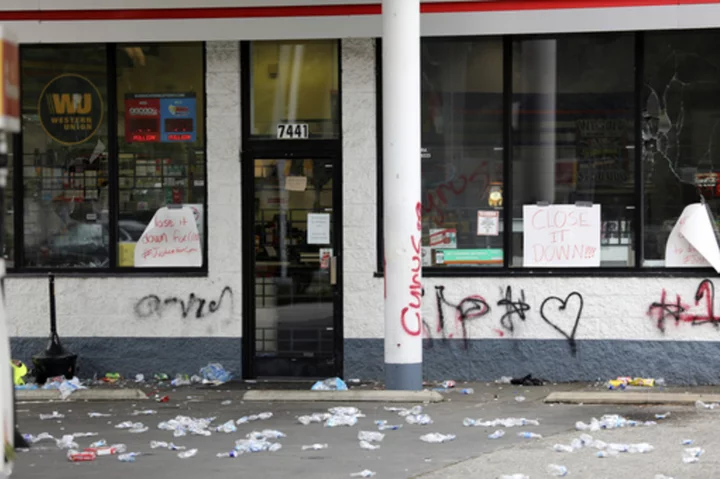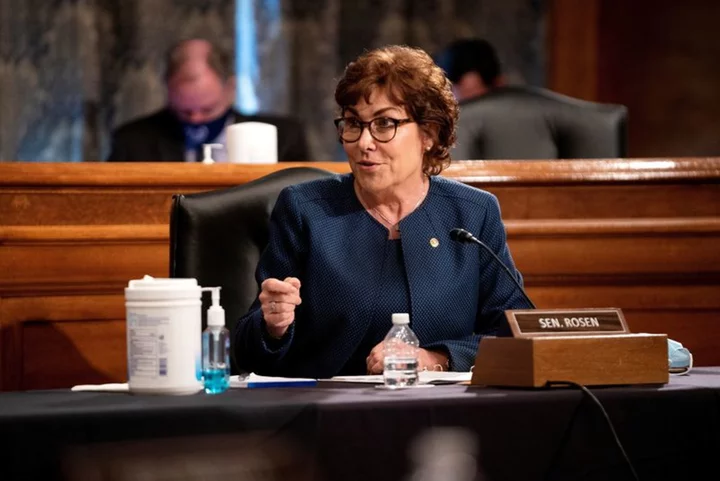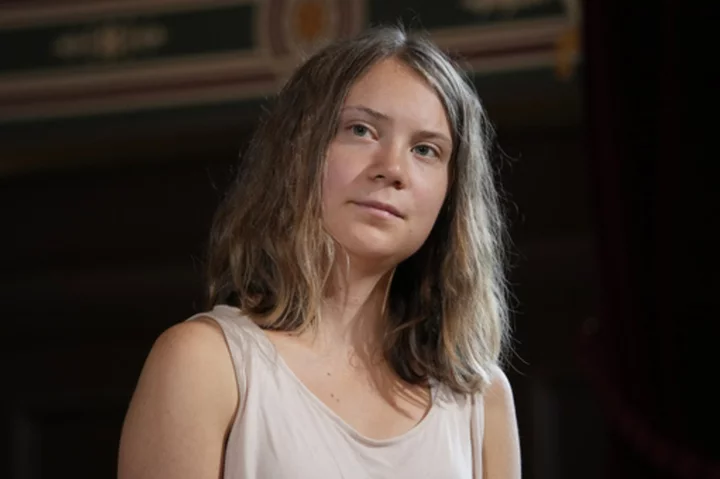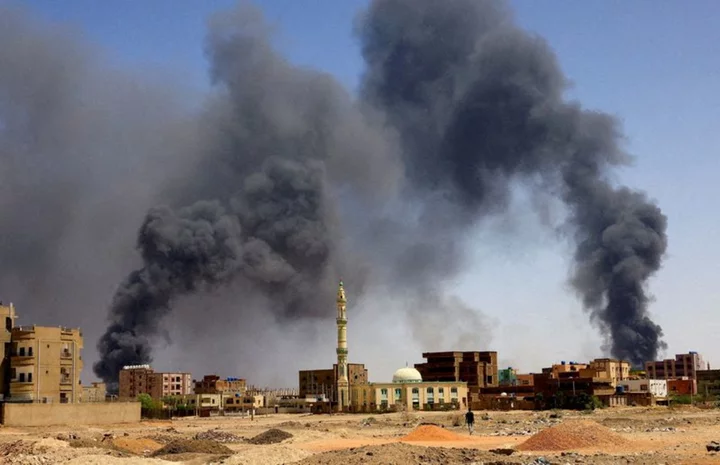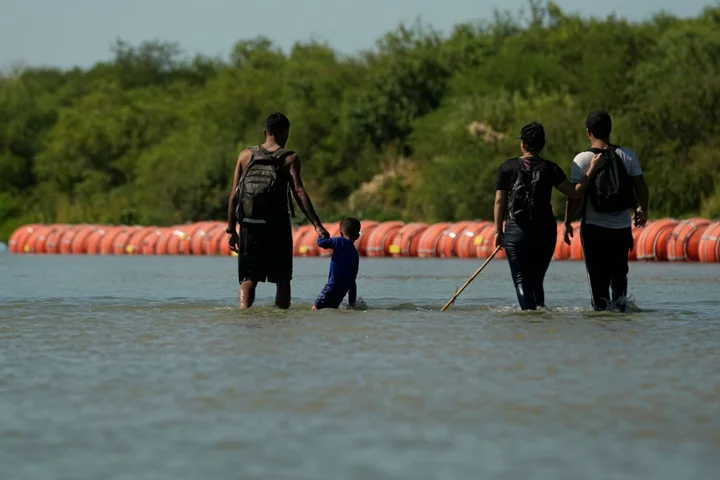The men in the wedding hall at the Dheisheh refugee camp in the West Bank spend most of their days and nights glued to their phones, smoking, constantly refreshing their news feeds. They look exhausted, the horrors of the last few days clearly visible on their faces.
These 180 men -- they are all men -- are refugees from Gaza. They are among the roughly 18,000 residents of the enclave who have Israeli work permits and are allowed to cross the border back and forth. When the Israel Defense Forces (IDF) shut all access to Gaza following Hamas' deadly attack last Saturday, these men became stuck.
Their wives and children are still in Khan Younis, a town in southern Gaza that is now the epicenter of its own rapidly unfolding refugee crisis, with no way of getting out.
The IDF has been relentlessly pounding Gaza with airstrikes and artillery after Hamas fighters staged a terror attack and launched thousands of rockets that so far have killed at least 1,400 people. The terror group also kidnapped some 150 others last Saturday during their unprecedented rampage.
Israel's military says their goal is to destroy Hamas and ensure it can never again carry out such an attack. But the civilian toll of the campaign has been immense. The Palestinian Ministry of Health in Gaza said 2,450 have been killed in the past eight days, which is more more than during the entire 2014 war, which lasted 51 days.
Ismail Abd Almagid's wife and five children -- fouwr girls and one boy -- are in Gaza while he is staying in the refugee camp. He has videos of all of them on his phone. One shows his young daughter Misk eating a piece of mango. When he plays the clip, tears start streaming down his face.
Tala, his second-oldest daughter, was injured in the 2014 war when the family was staying at his parents' house. "She loves roller skates, so I told her I'll bring them when I come back," he said.
Abd Almagid, 44, told CNN he tries to keep in touch with his wife at all times, but communication has been difficult since Israel cut off the Gaza's access to electricity, food and water.
"My children are telling me to pray for them. The situation is very difficult over there," he said. "I'd go back (to Gaza) right now ... even with everything that's going on, take me to Gaza, I will go with you right now ... my life is not worth it without my family."
Right now a huge population shift is underway in Gaza, with hundreds of thousands heading south, many heading to the overcrowded streets of Khan Younis.
The Israeli military told people living in densely populated northern Gaza, including Gaza City, to relocate to the south of the strip. The United Nations said the instruction, which it said affects 1.1 million people, would cause "devastating humanitarian consequences."
The IDF told CNN Sunday they estimated 500,000 people have left northern Gaza for the south so far.
When Abd Almagid got his permit to work in Israel in October last year, it felt like winning the lottery. The economy in Gaza, which is ruled by Hamas but blockaded by Israel and Egypt, has been decimated, and the unemployment rate stands at 45%, according to the Palestinian Central Bureau of Statistics.
"I always wanted this permit because the situation in Gaza is very dire. The financial situation, the debt ... the economy is zero. There's no work opportunities," he said, adding that he had been unemployed since graduating in 2004 when he got the permit.
Israel began issuing thousands of work permits for Gazans to cross into Israel as part of an economic incentive strategy Israeli authorities had hoped would deter Hamas from further armed conflict.
His wife, who has an English degree, is also without work. He said he was spending every other week in Israel, where he worked at a bakery.
Many of the men at the Dheisheh refugee camp are in the same situation -- they are the only members of their families to have a job. The salaries they earn in Israel are multiple times higher than anything they'd be able to get in Gaza.
Marwan Saqer, 55, is the only one of his entire family to have a job -- and the only one to have ever stepped foot outside of Gaza.
He was working at a construction site in Kafr Qassem, an Arab town near Tel Aviv, when Hamas attacked Israel. He said that the Palestinian Authority told him and other Gazans to come to the West Bank after their Israeli work permits were canceled.
He said the people of Dheisheh welcomed them with open arms, bringing them mattresses, blankets and basic supplies, and providing comfort and company.
The Dheisheh camp in Bethlehem was first established in 1949, when 3,000 Palestinians settled there after being expelled or fleeing from villages west of Jerusalem.
The camp's population has since grown to more than 18,500 people who are still living in a now-built-up area of one third of a square kilometer, according to the UN's Relief and Works Agency for Palestine Refugees.
The walls of the camp are decorated with portraits of its residents, mostly young men, who have been killed in the decades-long Israeli-Palestinian conflict. The tradition started in the 1990s as a way to commemorate them and has persisted until now.
While the camp is under Palestinian control, the IDF regularly conducts incursions, arresting people and conducting raids. Local residents told CNN the IDF came on Sunday morning and detained three people. While 180 people from Gaza have already arrived to the camp, more were expected to come in the coming days.
Marwan Saqer said that as far as he knows, his wife and eight children have left their home in central Gaza three or four times in the past week, but are now back.
While speaking to CNN, Saqer's phone rang several times -- his son was calling him from Gaza. He picked up, but got disconnected almost immediately, the signal on the other side failing.
"We speak, but they only tell me half the truth. They don't want to make me more worried," he told CNN.
The fact that it's the husbands and fathers who are in the relative safety of the refugee camp while women and children are in Gaza is weighing hard on these men.
"It's difficult. We all sit together, and we share our feelings. We all feel the same all the fathers. We all feel the suffering of our children," Saqer said.
The space is getting claustrophobic, and the atmosphere is tense. Arguments can erupt easily over issues like access to power plugs.
"There are people within our group that stay up all night crying," Saqer said. "All of us, physically, we are here, but our minds are in Gaza."

